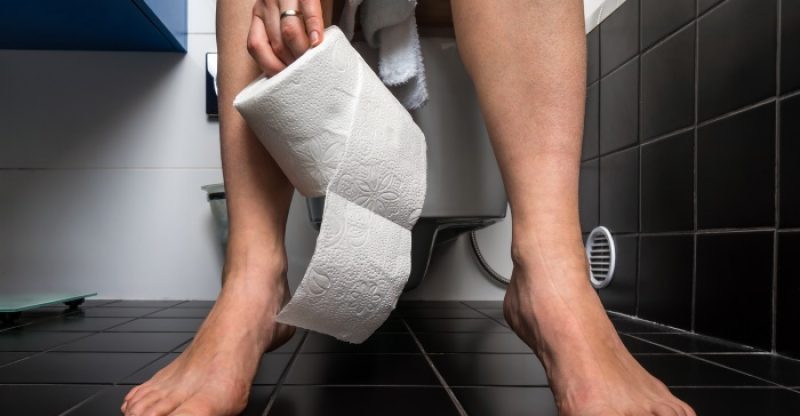Blood in Stool Causes, Potential Problems and 6 Natural Remedies
If you see blood in your own stool, it can be very disconcerting.
Blood in your feces can signal just a minor problem, but it could also be a sign that something more significant is wrong.
Bloody stools should not be ignored, as determining the cause is essential for your health (1).
Knowing what bloody or black stools mean, when to see a doctor, and what you can do at home to treat problems naturally are all important for preventing serious problems, and our guide will give you all the answers.
You can tell if you have blood in your feces by looking for a number of signs.
Black or tarry feces indicates blood in your stool, so you are not just looking for bright red blood.
Each of these means you are bleeding in different parts of your gastrointestinal tract, and this color is a vital diagnostic tool.
Many parts of your body can have internal bleeding that shows up in your stool.
Knowing these signs and paying attention to your body can help you detect problems, and seek help when necessary.
Understanding Blood in Your Stool
Normal feces are brown, so if your stool appears a different color, you may have a problem somewhere in your digestive system.
If you have bright red or black blood in your stool, you are likely bleeding either in your upper or lower gastrointestinal (GI) tract, or you may be bleeding from your rectum or anus.
If you see bright red blood mixed with your feces, this is known as hematochezia and is a signal of probable bleeding in your lower GI tract.
If your stool is black and tarry, this is referred to as melena and is the result of bleeding in the upper GI tract (2).
As the hemoglobin in your blood travels through your digestive tract and is exposed to digestive enzymes and bacteria, it is altered and becomes black, and will likely have a strong smell (3).
In contrast, blood on your toilet paper after wiping probably indicates bleeding from your anus or hemorrhoids.
It is never normal for there to be blood in your stool.
Blood in your feces can indicate a severe problem that requires medical attention, so while it may not be a pleasant task, paying attention to your feces regularly can alert you to potential issues you need to address.
Symptoms
It may seem obvious that the most concerning symptom of blood in your stool is just that – blood in your stool.
In addition to the evident bright red blood or black tarry stools, though, there are other symptoms to watch for and note, that can tell you if you have a problem internally.
If you notice blood in your stool and have other symptoms, you should contact your doctor.
If you notice other symptoms, it is a good idea to check your stool for evidence of blood.
Symptoms that often accompany blood in the stool include weakness, pain in the abdomen, trouble breathing, vomiting, diarrhea, heart palpitations, or unexplained weight loss.
If you notice a significant amount of mucus in your stool, whether accompanied by blood or not, you should also talk with your doctor.
If you notice any of these and also have blood in your stool, you should see a medical professional immediately.
Depending on the cause, the severity of the bleeding, and the source, you may need immediate medical attention.
Causes of Blood in Your Stool
You might have blood in your stool from a number of problems within your digestive system.
Because your digestive system encompasses organs and body parts from your mouth to your anus, it can be difficult to discern the exact source of bleeding without diagnostic tests.
In general, black or tarry feces are the result of bleeding in the upper GI tract, like the stomach or esophagus.
Bright red or maroon-colored blood in your stool typically comes from the lower GI tract, like the anus, rectum, and small or large intestine.
Bright red blood on your toilet paper but not in your stool is usually a result of anal bleeding or hemorrhoids.
Bleeding in the upper GI tract can be caused by many different problems and diseases, and your doctor will need to do additional tests to determine the exact nature and cause of your issues.
The leading causes of upper GI bleeding, or hematochezia, are (6):
- Mallory-Weiss tears in the esophagus, caused by violent vomiting;
- Irregular or abnormal blood vessels in your digestive system;
- An interruption in the blood supply to the intestines;
- A bleeding gastric ulcer;
- Trauma, such as from a car accident, fall, or other injuries;
- Gastritis;
- A foreign body in your digestive system;
- Veins in the stomach or esophagus that are overgrown or widened.
Lower GI bleeding is also caused by a number of problems, some of which are easier to detect and treat than others.
Additional tests and a physical exam will help your doctor determine if any of the following is causing you to have bright red stools, known as melena.
Common causes include (7):
- Anal fissures;
- Diverticulitis;
- Bowel ischemia
- Abnormal blood vessels in your lower GI tract;
- A foreign body in your lower GI tract;
- Trauma;
- Inflammatory bowel disease, like ulcerative colitis or Crohn’s disease;
- An infection in your large and/or small intestines;
- Hemorrhoids;
- Polyps or cancer of the small intestines or colon.
Because the color of the blood in your stool plays a vital role in the diagnosis of possible digestive problems, paying attention to this detail will be critical information to share with your healthcare provider.
While a bleeding ulcer may manifest as tarry, black stools, hemorrhoids will manifest as bright red blood.
Conventional Treatments
Your doctor will want to determine the nature and cause of the blood in your fecal matter.
Depending on the color of the blood and your medical history, there are a number of diagnostic tools he or she may use to find the source of the bleeding.
The most common are (8):
- Barium studies;
- An angiogram
- Blood work, including blood count and other measures;
- Colonoscopy;
- Bleeding Scan;
- Stool test;
- H. pylori test, to determine if you have the bacteria in your system;
- Double-balloon enteroscopy;
- Upper endoscopy, or a capsule endoscopy.
Depending on what is determined by these tools, your doctor will consider different treatment methods.
Because the causes of blood in your stool vary widely, conventional treatments will also change accordingly.
Natural Remedies
Depending on the cause of blood in your stool, there may be ways to treat your problems naturally.
Not all causes of blood in your stool can be treated effectively using natural therapies, but there are some that may be effective or help you eliminate your symptoms.
The following are our favorite natural treatments for a few of the causes of blood in your stool.
Treating Bleeding Gastric Ulcer
If you have a bleeding stomach or peptic ulcer, the lining of your digestive tract has developed tears or holes that have begun to bleed.
If you vomit and see blood or notice tarry, black stools, you could have a bleeding ulcer.
There are ways to reduce the symptoms of your bleeding ulcer to treat it naturally.
First, avoid all foods that make your ulcer symptoms worse, including caffeine, spicy foods, alcohol, and refined sugars.
If you have any food allergies or sensitivities, avoid these foods at all costs.
Eating fiber-rich foods will help your digestive system heal.
Fermented foods can also help restore the natural probiotics in your system, which will aid digestion.
And cabbage juice has been shown to promote healing of peptic ulcers (9).
To heal your peptic ulcer, focus on eating whole foods, including fresh fruits and vegetables, lean proteins, legumes, and foods naturally low in sugar and fat.
This diet will provide you with the necessary nutrients, high amounts of fiber, essential amino acids, fatty acids, and other healthy components that can heal your stomach ulcer (10).
Treating Diverticulitis
Your colon contains small pouches, known as diverticula, that can become inflamed.
When this inflammation occurs, you develop diverticulitis, which can cause many different gastrointestinal symptoms.
To help calm inflammation and allow your gut to heal itself, try drinking bone broth or homemade protein powder.
The protein and other nutrients in these foods can help your digestive system heal itself, and relieve the symptoms of diverticulitis.
The chronic use of non-steroidal anti-inflammatory drugs (NSAIDs) is linked to a number of gastrointestinal diseases, including diverticulitis (11).
These drugs can make bleeding and other problems worse, so avoid using aspirin, ibuprofen, acetaminophen, and naproxen if you have diverticulitis, a bleeding ulcer, or other GI tract bleeding problems.
Eating high-fiber foods will also help with diverticulitis.
Fiber will bulk up your stools and make them easier to pass.
Diets low in fiber contribute significantly to diverticulitis symptoms (12).
Treating Gastritis
Your GI tract is lined with gastric mucosa, and when this lining is damaged or inflamed, you develop gastritis.
Gastritis symptoms resemble those of an ulcer, and you can develop blood in your stool when this inflammation and damage are severe.
Changing your diet can calm inflammation, and help your mucosa heal naturally.
If you have gastritis, your diet should be composed primarily of whole foods like fruits, vegetables, healthy fats, and unprocessed high-quality proteins.
Also, be sure you are eating plenty of fiber, antioxidants, and probiotics to help your gut heal and restore itself.
Antioxidants like Vitamins B12 and C are great for boosting your immune system.
Avoiding the same triggers that worsen ulcer symptoms will also help with gastritis.
Try not to eat within a few hours of bedtime, which will give yourself plenty of time to digest your food before you lie down at night.
If you have gastritis, you will want to reduce your stress as much as possible, too.
Natural anti-inflammatories like licorice root can help treat gastritis and other GI problems.
Licorice root contains natural enzymes which stimulate mucus production (13).
And fennel relieves many GI symptoms and can help your body to heal naturally.
Treating Crohn’s Disease
If your bloody stool is caused by Crohn’s disease, there are many things you can do to help reduce your Crohn’s symptoms at home.
Depending on the severity of your Crohn’s disease and which symptoms you exhibit, some natural treatments are more effective than others at helping relieve this disease’s symptoms.
Slippery elm is a popular herbal treatment for Crohn’s and other inflammatory bowel diseases.
Slippery elm promotes healing and protects the irritated tissue of your GI tract.
When mixed with water, slippery elm’s natural mucilage becomes slick.
This then coats the digestive tract to soothe irritated and inflamed tissue, which is common in those suffering from Crohn’s (14).
Treating Ulcerative Colitis
Another form of inflammatory bowel disease, ulcerative colitis can also cause blood in your stool.
Like all digestive issues, changing your diet can greatly improve the symptoms you experience from ulcerative colitis.
This disease can be triggered by common irritants like alcohol, caffeine, spicy foods, refined sugars, and carbonated beverages.
Avoid common allergens like dairy and gluten if these make your ulcerative colitis symptoms worse.
Focus your diet on inflammation-lowering foods that are rich in omega-3 fatty acids, probiotics, and fiber to help reduce your ulcerative colitis symptoms.
Turmeric can be used to treat this digestive disorder naturally, as well.
Whether fresh from the root or in supplement form, turmeric and its active ingredient, curcumin, has been shown to be very effective at treating a wide range of inflammation disorders like ulcerative colitis.
Once your symptoms are reduced and your ulcerative colitis is in remission, turmeric can help you stay symptom-free, as well (15).
Stress is a significant trigger for ulcerative colitis symptoms, so managing yours and getting more relaxation time will be essential to reducing your symptoms, too.
Find techniques for stress relief that work best for you and your needs, and practice these regularly.
Hemorrhoids
Another common and less serious source of blood in your stools is hemorrhoids.
These inflamed and swollen veins in your lower rectum and anus are caused by a number of different factors.
Common causes of hemorrhoids include:
- Straining during a bowel movement;
- Pregnancy;
- Being obese or overweight;
- Chronic constipation;
- Eating a low-fiber diet;
- Prolonged sitting.
You can develop hemorrhoids on the inside or outside of your body.
When the delicate surface of these enlarged veins is damaged, they will bleed.
When hemorrhoids are located on the outside, around the anus, they can cause pain, itching, and other symptoms, in addition to blood in your stool.
If you notice these symptoms or painful swelling around your anus, you likely have hemorrhoid.
Nearly half of all adults will have at least one hemorrhoid in their lifetime, and mild hemorrhoids are easily treated with natural or over-the-counter treatments.
If your hemorrhoids are severe, you may need surgery or a medical procedure to heal the damage or stop the bleeding.
You can help avoid hemorrhoids, or them to heal naturally, with the following treatments.
- Avoid straining on the toilet. When you need to use the bathroom, be sure you go and do not wait. Waiting makes your stool become harder and more compact, which means you have to work harder to evacuate your bowels. Take your time, relax, and let your body naturally move. Do not strain, if at all possible.
- Prevent being constipated, which will force you to strain. Drink lots of water, be sure you are getting regular exercise, and eat a fiber-rich diet to help avoid constipation. Not only can these strategies help you heal hemorrhoid, but they can also prevent them from forming at all.
- Use good hygiene. When you wipe, if you leave material behind, this can irritate hemorrhoid. Clean yourself thoroughly after each bathroom visit, but be gentle so as not to create more inflammation. Avoid chemicals, harsh cleansers, or perfumed products.
- If your hemorrhoids are itchy, sitting in warm water for ten minutes twice a day can relieve your symptoms naturally.
When to See a Doctor
Many of the causes of blood in your stool are serious medical problems that should be treated in a timely manner.
Seek immediate medical attention for the blood in your stool if you also have any of these symptoms:
- There is a great deal of blood;
- Your heart is racing;
- You feel lightheaded;
- You are weak.
A few foods can cause your stools to be temporarily discolored.
If you have recently eaten blueberries, beets, black licorice, or tomatoes, these can make your stools black or red for a short period.
If you notice this discoloring after eating these foods, do not become alarmed unless the discoloration continues long after the foods have passed from your system.
Some medicines, such as Pepto-Bismol and iron supplements, can also turn your stools black.
Be sure to read all medication labels carefully to understand their side effects.
Because polyps and cancer may cause blood in your stool, you want to get your bleeding checked out quickly.
Colon cancer is now the third most common type of cancer, and without treatment, this disease can be fatal.
Paying attention to your stool can help you detect the signs of colorectal cancer.
If you notice blood or bloody mucus in your stool, and also have other symptoms, like abdominal pain, talk with your doctor.
These are signs of serious gastrointestinal problems that should be treated.
Always talk with your doctor about any medicines or supplements you are taking, as some may make GI problems worse, or contribute to your symptoms.
While diseases like Crohn’s, gastritis, and ulcerative colitis should be treated by a doctor, there are many natural treatments that can help reduce symptoms and allow your body to heal itself.
Precautions
Seeing blood in your stool is a cause for concern, as it can signal an internal problem with your digestive system.
Noting the color, frequency, and other symptoms you are experiencing will be helpful information to share with your doctor.
Your healthcare professional may perform diagnostic tests to determine where you may be bleeding, or the exact nature of your GI problems.
Treating blood in your stool will vary depending on the source, but eating a healthy, whole-foods diet rich in healthy fats and fiber is a good way to treat nearly any digestive problem.
In addition, certain herbs and natural remedies have anti-inflammatory properties that can help calm irritation and provide relief.
Avoiding foods that trigger flares or make symptoms worse will also be helpful in preventing blood in your stool, or other GI symptoms.
It is important that your medical professionals be able to determine the cause of your intestinal bleeding in order to treat your problem accurately.
Conventional and natural treatments work best when they are targeted at the right problem.
Eliminating the source of your internal or external bleeding will be most important for restoring your health, and for helping you feel more comfortable in the bathroom once again.
FDA Compliance
The information on this website has not been evaluated by the Food & Drug Administration or any other medical body. We do not aim to diagnose, treat, cure or prevent any illness or disease. Information is shared for educational purposes only. You must consult your doctor before acting on any content on this website, especially if you are pregnant, nursing, taking medication, or have a medical condition.
HOW WOULD YOU RATE THIS ARTICLE?






